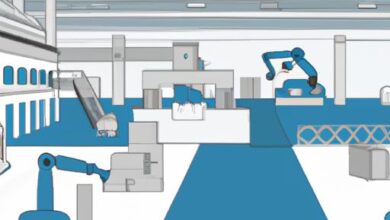Unleashing Innovation: Exploring Industry 4.0 Ideas

Introduction
In today’s fast-paced world, industries are constantly evolving to adapt to new technologies and meet the demands of the digital age. One such transformative concept is Industry 4.0, a term that symbolizes the ongoing revolution in manufacturing and production. But what exactly does Industry 4.0 mean? And why are industry 4.0 ideas so crucial in shaping the future of businesses?
A. What is Industry 4.0?
Industry 4.0 refers to the integration of advanced technologies and digital innovations into industrial processes, fostering a new wave of efficiency, automation, and connectivity. It encompasses the fusion of physical systems with virtual components, creating what is known as a “smart factory.” With intelligent machines, real-time data analysis, and seamless communication networks, Industry 4.0 aims to optimize operations and revolutionize the way industries function.
B. Importance of Industry 4.0 Ideas
Industry 4.0 ideas are the driving force behind this revolutionary wave. They encompass innovative concepts, strategies, and solutions that empower businesses to thrive in the digital era. Embracing Industry 4.0 ideas can lead to improved efficiency, enhanced decision-making processes, cost reduction, and increased competitiveness. This paradigm shift enables companies to adapt to ever-changing market dynamics, meet customer expectations, and stay ahead of the curve.
But how can businesses harness the power of Industry 4.0 ideas to unlock their full potential? Let’s delve deeper into the benefits and explore some inspiring examples that illustrate the transformative nature of Industry 4.0 ideas.
Benefits of Industry 4.0 Ideas
The implementation of Industry 4.0 ideas offers a wide array of benefits for businesses across various sectors. Let’s explore some of the key advantages that arise from embracing this transformative concept.
A. Improved Efficiency and Productivity
Industry 4.0 ideas revolutionize traditional manufacturing processes by introducing automation, robotics, and advanced analytics. By integrating intelligent machines and systems, businesses can streamline operations, reduce manual labor, and enhance overall productivity. With real-time data insights and predictive maintenance, companies can optimize production schedules, minimize downtime, and improve the quality of their products. The result? Increased efficiency and faster time-to-market, enabling businesses to stay competitive in this rapidly evolving landscape.
B. Enhanced Decision-Making Processes
In the era of Industry 4.0, data is king. With the help of advanced analytics and machine learning algorithms, businesses can gather and analyze vast amounts of data in real-time. This data-driven approach empowers decision-makers to make informed choices, identify patterns, and uncover valuable insights. By leveraging this information, companies can anticipate market trends, optimize supply chain management, and make proactive decisions that drive growth. The ability to make data-backed decisions is a game-changer, enabling businesses to adapt swiftly to market fluctuations and maintain a competitive edge.
C. Cost Reduction and Resource Optimization
Industry 4.0 ideas bring significant cost-saving opportunities for businesses. By automating processes and optimizing workflows, companies can reduce labor costs, minimize waste, and enhance resource utilization. The seamless integration of machines, systems, and data enables businesses to monitor energy consumption, identify inefficiencies, and implement sustainable practices. This not only reduces operational costs but also contributes to environmental sustainability, aligning businesses with the growing demand for eco-friendly practices.
D. Increased Competitiveness in the Market
Embracing Industry 4.0 ideas can give businesses a significant advantage in the market. By leveraging advanced technologies such as artificial intelligence, IoT integration, and big data analytics, companies can innovate their products and services. This enables them to deliver personalized customer experiences, meet evolving market demands, and outpace competitors. By staying at the forefront of technological advancements, businesses can establish themselves as industry leaders, attracting customers and driving growth.
With a solid understanding of the benefits that Industry 4.0 ideas bring, let’s now delve into some inspiring examples that demonstrate the practical implementation of these concepts.
Examples of Industry 4.0 Ideas
In the realm of Industry 4.0, a wide array of innovative ideas and technologies are reshaping the industrial landscape. Let’s explore some compelling examples that highlight the transformative potential of Industry 4.0:
A. Smart factories and automation
Smart factories are at the forefront of Industry 4.0, leveraging automation and intelligent systems to optimize production processes. By integrating sensors, robotics, and advanced analytics, these factories enable real-time monitoring, predictive maintenance, and streamlined workflows. Through automated systems, businesses can achieve higher productivity, reduced downtime, and improved product quality.
B. Internet of Things (IoT) integration
The Internet of Things (IoT) plays a pivotal role in Industry 4.0 by connecting devices, sensors, and machines to enable seamless communication and data exchange. IoT integration allows businesses to gather real-time data from various sources, facilitating predictive maintenance, inventory management, and supply chain optimization. This interconnected ecosystem enhances operational efficiency, reduces costs, and enables proactive decision-making.
C. Artificial intelligence and machine learning
Artificial intelligence (AI) and machine learning (ML) technologies empower businesses to extract valuable insights from vast amounts of data. AI algorithms can analyze complex patterns, predict trends, and automate decision-making processes. Machine learning algorithms continuously learn from data, enabling businesses to optimize production, improve quality control, and personalize customer experiences. These technologies enhance operational efficiency, increase productivity, and drive innovation.
D. Big data analytics and predictive maintenance
Industry 4.0 leverages big data analytics to unlock valuable insights from vast datasets. By analyzing historical and real-time data, businesses can identify patterns, detect anomalies, and predict maintenance needs. Predictive maintenance allows companies to proactively address equipment failures, reduce downtime, and optimize maintenance schedules. This data-driven approach enhances productivity, extends the lifespan of assets, and minimizes costs.
E. Augmented reality and virtual reality applications
Augmented reality (AR) and virtual reality (VR) technologies are revolutionizing various industries by providing immersive and interactive experiences. In manufacturing, AR and VR applications offer virtual training, remote assistance, and simulations, improving employee skills, reducing errors, and increasing efficiency. These technologies also aid in product design, prototyping, and customer visualization, enhancing collaboration, and accelerating innovation.
By embracing these Industry 4.0 ideas, businesses can unlock immense potential, foster innovation, and gain a competitive edge in the ever-evolving marketplace. The next section will delve into the implementation strategies and challenges associated with adopting Industry 4.0 ideas.
Implementing Industry 4.0 Ideas
Industry 4.0 ideas hold immense potential, but their successful implementation requires careful planning and execution. Let’s explore the crucial steps involved in harnessing these ideas to transform your business.
A. Identifying key areas for improvement
The first step in implementing Industry 4.0 ideas is to identify the areas within your business that can benefit the most from digital transformation. Conduct a comprehensive assessment of your operations, analyzing inefficiencies, bottlenecks, and pain points. By understanding your specific needs, you can prioritize the adoption of relevant Industry 4.0 technologies and strategies.
B. Collaborating with technology partners
To navigate the complexities of Industry 4.0, it is essential to collaborate with technology partners who specialize in the relevant domains. Seek out expertise from vendors, consultants, or research institutions to gain insights into cutting-edge solutions and industry best practices. Partnering with the right experts can help you tailor Industry 4.0 ideas to your unique requirements and accelerate the implementation process.
C. Developing a roadmap for implementation
Creating a roadmap is vital to ensure a systematic and phased implementation of Industry 4.0 ideas. Start by defining clear goals and objectives, then break them down into actionable steps. Consider factors such as budget, timeline, resource allocation, and risk management. A well-defined roadmap will guide your organization through the transformation journey and provide a structured approach to adapt to Industry 4.0 principles.
D. Ensuring employee training and buy-in
The success of Industry 4.0 implementation heavily relies on the involvement and acceptance of your workforce. Empower your employees by providing comprehensive training programs to enhance their digital skills and familiarize them with the new technologies. Emphasize the benefits of Industry 4.0 ideas and foster a culture of innovation and continuous learning. By gaining employee buy-in, you can overcome resistance to change and create a more collaborative and productive work environment.
E. Monitoring and evaluating the progress
Continuous monitoring and evaluation are vital to ensure the effectiveness of Industry 4.0 implementation. Establish key performance indicators (KPIs) aligned with your goals and regularly track progress. Leverage data analytics to gain insights into the impact of Industry 4.0 ideas on your business. This iterative process will help you identify areas for improvement, make data-driven decisions, and optimize your operations further.
By following these steps, you can effectively implement Industry 4.0 ideas and unlock their transformative potential. But what are some of the challenges you might encounter along the way? In the next section, we will explore these challenges and provide solutions to overcome them.
Challenges and Solutions in Implementing Industry 4.0 Ideas
Embracing Industry 4.0 ideas comes with its fair share of challenges, but with careful planning and strategic solutions, these hurdles can be overcome. Let’s explore some of the key challenges that organizations may face when implementing Industry 4.0 ideas, along with potential solutions:
A. Cybersecurity risks and data protection
As industries become more interconnected and reliant on technology, the risk of cyber threats and data breaches becomes a critical concern. Safeguarding sensitive information and protecting against potential attacks is paramount. Implementing robust cybersecurity measures, such as encryption protocols, regular system audits, and employee training on best practices, can help mitigate these risks.
B. Upgrading existing infrastructure and systems
Transitioning to Industry 4.0 often requires upgrading existing infrastructure and systems. This can be a complex and costly process, especially for businesses with outdated technology. However, investing in modernizing equipment, integrating IoT devices, and leveraging cloud computing can pave the way for a seamless transition. Collaborating with technology partners and utilizing scalable solutions can help alleviate the financial burden.
C. Addressing the skills gap and workforce transformation
With the advent of Industry 4.0, the demand for a skilled workforce proficient in digital technologies increases. However, many organizations struggle to bridge the skills gap and upskill their workforce. Offering training programs, partnering with educational institutions, and providing continuous learning opportunities can empower employees to adapt and thrive in the era of Industry 4.0.
D. Change management and cultural shift
Implementing Industry 4.0 ideas requires a cultural shift within organizations. Resistance to change, fear of job displacement, and lack of buy-in from employees can hinder progress. Effective change management strategies, clear communication of benefits, and involving employees in decision-making processes can help foster a positive mindset and encourage innovation.
E. Establishing clear communication channels and feedback loops
To ensure successful implementation of Industry 4.0 ideas, effective communication channels and feedback loops must be established. Regular communication between different departments, from management to frontline workers, is crucial for identifying potential roadblocks and gathering valuable insights. Creating a culture of open communication and feedback enables continuous improvement and drives the successful adoption of Industry 4.0 ideas.
By recognizing these challenges and implementing strategic solutions, organizations can navigate the complexities of implementing Industry 4.0 ideas and fully reap the rewards of this transformative revolution.
Conclusion
As we conclude our exploration of Industry 4.0 ideas, it becomes clear that this paradigm shift is not just a passing trend but a necessity for businesses to thrive in the digital age. By embracing innovative concepts and integrating advanced technologies, companies can unlock a world of possibilities and gain a competitive edge in the market.
The benefits of Industry 4.0 ideas are undeniable. From improved efficiency and productivity to enhanced decision-making processes, businesses can streamline operations, optimize resources, and make data-driven decisions. This, in turn, leads to cost reduction, increased competitiveness, and ultimately, long-term success.
However, implementing Industry 4.0 ideas is not without its challenges. Cybersecurity risks, upgrading infrastructure, addressing the skills gap, and managing change are all hurdles that organizations must overcome. But with careful planning, collaboration, and a clear roadmap, these challenges can be tackled head-on, ensuring a smooth transition towards Industry 4.0.
In conclusion, Industry 4.0 ideas hold immense potential for businesses across various sectors. It is a journey of continuous innovation, where companies must embrace change, foster a culture of experimentation, and leverage the power of advanced technologies. By doing so, we can create a future where industries thrive, economies prosper, and individuals benefit from the boundless opportunities that Industry 4.0 ideas bring.
So, are you ready to embark on this transformative journey? Let us embrace Industry 4.0 ideas and unleash innovation to shape a better future for our businesses and society as a whole.
Remember, the future is now, and Industry 4.0 is the key to unlocking its endless possibilities.
Conclusion: So above is the Unleashing Innovation: Exploring Industry 4.0 Ideas article. Hopefully with this article you can help you in life, always follow and read our good articles on the website: transfer.dulich3mien.vn


